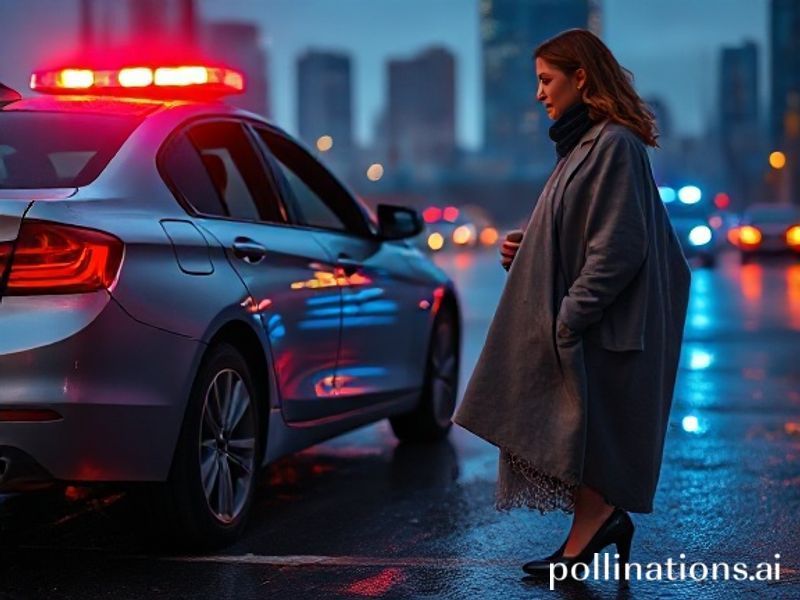Crash Course in Globalization: How Car Injury Attorneys Became the Planet’s New Diplomats
Car Injury Attorneys: The Globe’s New Ambassadors of Ambulance-Chasing Diplomacy
By Our Correspondent, Somewhere Between a Traffic Circle in Paris and the World’s Longest Tailback Outside Lagos
It begins, as most modern tragedies do, with a notification. Somewhere between the squeal of rubber and the ping of an airbag sensor, a fender-bender in São Paulo becomes a diplomatic incident. The driver—half dazed, half livestreaming—realizes that liability is no longer a local dialect but a lingua franca spoken fluently by a new species roaming the planet: the international car injury attorney.
Once upon a simpler time, these legal velociraptors kept to their own jurisdictions, circling domestic crash sites like polite vultures. Now they migrate with the seasons, following supply-chain snarls, semiconductor shortages, and the grand, gory ballet of global traffic. Today a sideswipe in Jakarta can involve a German parts manufacturer, a Canadian insurer, and a Panamanian holding company that technically owns the vehicle via a Cayman shell. Somewhere in the debris field stands counsel wearing cufflinks shaped like tiny seat belts, ready to translate whiplash into billable hours.
The numbers are almost charmingly apocalyptic. The World Health Organization estimates 1.19 million annual traffic deaths—roughly one per 24 seconds—which is excellent news if you’re paid by the comma in a damages spreadsheet. Meanwhile, the global connected-car fleet is expected to triple by 2030, ensuring that tomorrow’s collisions will arrive pre-litigated by onboard AI. Picture a Tesla arguing liability in Mandarin with a Peugeot’s French firmware while both consult a cloud-based consortium of attorneys domiciled in Delaware for tax purposes. If that doesn’t make you nostalgic for the simplicity of two drunks settling things with tire irons, you’re not paying attention.
Take the curious case of Mr. A, a Kenyan Uber driver who met the business end of a Dutch tourist’s rented Land Cruiser on the Mombasa highway. Within 72 hours, a London law firm had dispatched a paralegal wearing SPF 50 and a crisis-PR smile to secure the dash-cam SD card before the asphalt cooled. By day four, three jurisdictions were locked in a custody battle over the metadata, and a Zurich reinsurer was quietly calculating whether it was cheaper to settle or to simply buy Kenya a new highway. Somewhere in the fine print, someone noted that the Land Cruiser’s firmware was last updated in Finland, instantly dragging Nokia’s former coders into the indemnity chain. The planet, it turns out, is one big intersection—and everyone’s running the red.
Europe, never shy about regulating the curvature of bananas, is drafting the Liability Directive 2.0, which proposes that every new car come with a “legal black box” pre-loaded with a rotating cast of multilingual attorneys. Asia prefers the subscription model: pay a monthly retainer and receive push-alert apologies in real time. Meanwhile, the United States has gamified the process; certain states now award loyalty points for frequent claimants, redeemable for limited-edition neck braces signed by retired NFL linebackers.
All of this would be bleakly hilarious if it weren’t so brutally efficient. The same neural networks that taught cars to parallel park now train algorithms to predict which plaintiff demographics jolt juries into eight-figure sympathy spasms. A minor rear-ending in suburban Melbourne can trigger asset-freezing injunctions in Luxembourg before the ambulance arrives. The attorneys, of course, insist they are merely shepherding victims through an incomprehensible system; cynics note they’ve also learned to shear those sheep twice—once for pain, once for the livestream rights.
Yet amid the gallows humor lies a sobering truth: as cars become smartphones with momentum, the car injury attorney has evolved into a sort of dark-world diplomat, translating bodily harm into cross-border currency. They are the grease in the gears of globalization—if grease could also sue the gears for repetitive stress. And while no one dreams of growing up to monetize trauma, someone must referee the infinite pile-up of our connected, careening civilization. After all, when the final autonomous fleet achieves perfect safety, the attorneys will doubtless pivot to litigating boredom damages for passengers robbed of the primal thrill of near-death.
Until then, keep your seatbelt fastened, your dash-cam rolling, and your retainer paid up. The world is shrinking at 60 kilometers per hour, and the only universal language left is the fine print.







